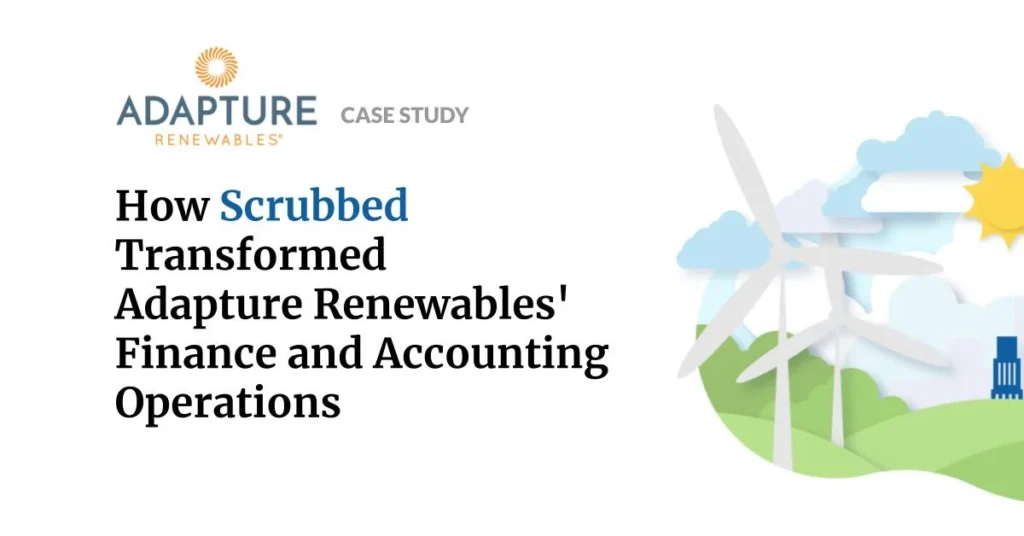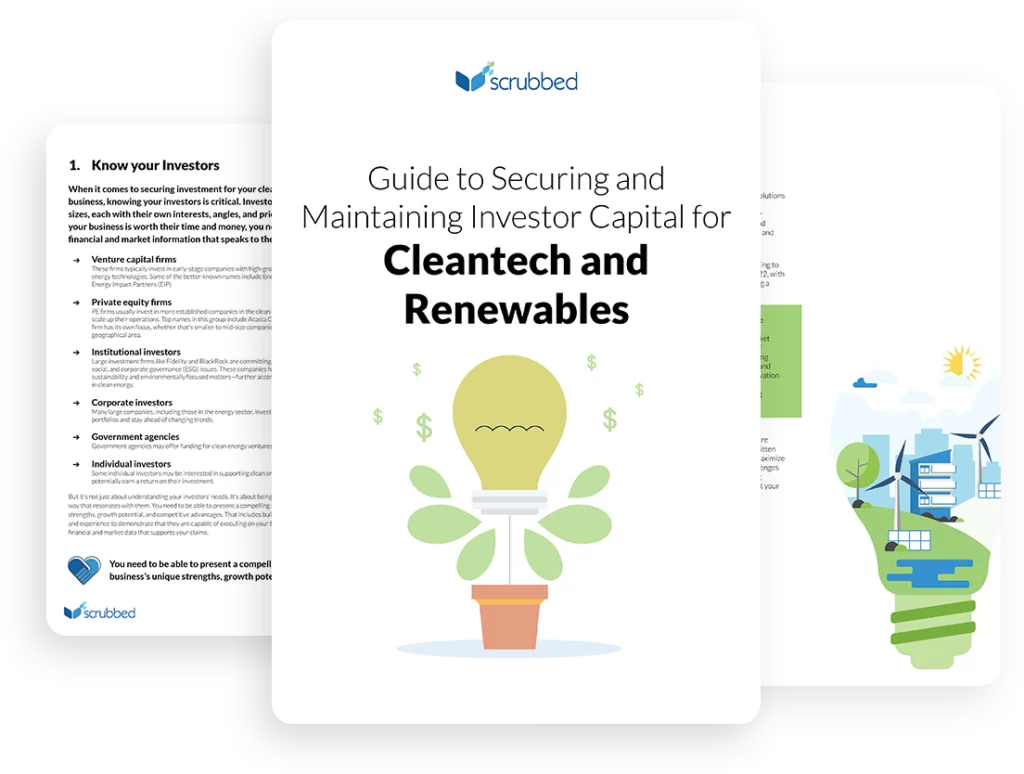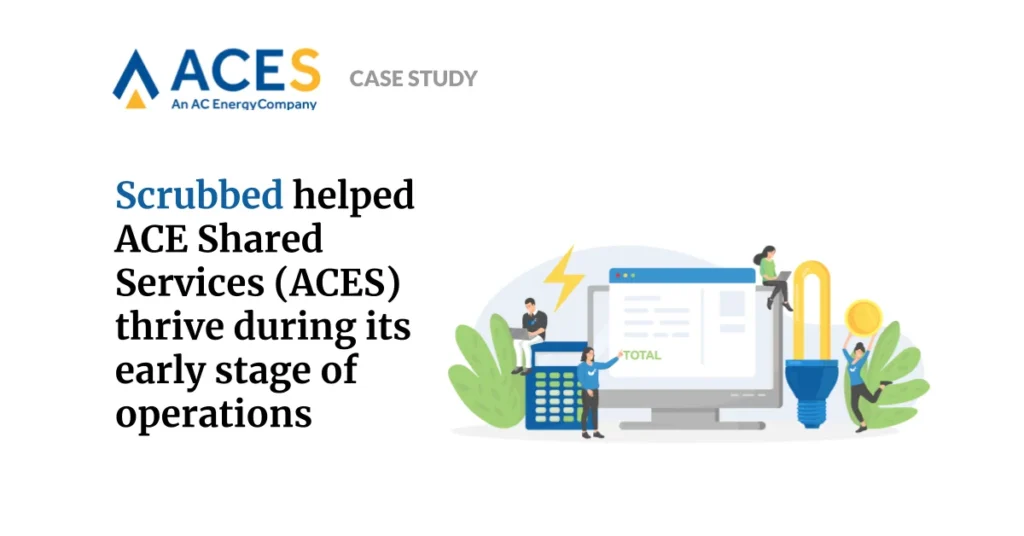Clean Technology and Renewable Energy Accounting
Optimize financial strategies with Scrubbed’s renewable energy accounting services. Navigate industry nuances, ensuring precision for your sustainable ventures.
Specialized Accounting for Renewable Energy Companies
The Renewable energy sector is growing fast as businesses and governments invest in fighting against climate change. Whether your focus is solar, wind, hydro, bioenergy, or other clean technologies, you face evolving finance and accounting issues as a result.
A renewable energy accountant partner who understands your industry can help you manage
complex accounting rules, maximize tax incentives, and comply with reporting requirements as you grow. That’s why clean energy companies choose Scrubbed. Our experienced renewable energy accountants provide the financial insight and support you need to scale with confidence.
Outsourced Renewable Energy Accounting Services
Depending on the stage and needs of your business, we can provide the following services:

Featured Work
Case Study
See how Scrubbed helped this solar energy company streamline its finances, track project performance, and grow strategically with our accounting and tax support.
Case Study
Your cleantech company is already focused on environmental goals through eco-friendly products or services, but your firm can also benefit from committing to environmental, social, and governance (ESG) principles across the business.
Guide
Today, the development and scaling up of cleantech and renewable energy technologies can require significant investment.
Case Study
Like many Clean Technology firms, ACES needed additional resources to effectively manage their expanding financial and accounting obligations
“Scrubbed has proven to be a reliable and trustworthy partner. They have constantly met deadlines and showcased their commitment to delivering high-quality work. We are grateful for their contribution to our company’s success and look forward to continuing our partnership in the future.”
Mary Osmond
Director of Legal and External Affairs, Forest Carbon

Ivan Kwan

Download Capabilities Brochure here:
Want to learn more about our services or meet more of the Scrubbed team?
Featured Insights
Meet Our Clean Technology and Renewable Energy Experts

Michael John David
Director
With more than 7 years of experience in the accounting profession, Michael John David has developed expertise in end-to-end property, fund, and corporate accounting of real estate clients, as well as audit and tax support services.

Lemmuel Jeremiah David
Senior Manager
Lemmuel has over 6 years of experience in accounting, finance, and auditing. He has been managing Scrubbed’s Real Estate Group, providing accounting services such as financial and investor reporting, consolidation, and audit support.
FAQ
For cleantech companies, outsourcing accounting means hiring a third-party firm to manage accounting tasks such as bookkeeping, financial reporting, grant management, and compliance with industry-specific regulations. Outsourced accounting services are flexible and can be tailored to cleantech needs, including tracking R&D costs, monitoring project funding, managing capital-intensive assets, and ensuring compliance with regulatory standards.
Learn more at Clean Technology and Renewable Energy Accountant | Scrubbed
Cleantech accounting can be complex, involving strict regulations, securing government grants with specific requirements, tracking R&D expenses, and managing complex project funding structures. That takes a lot of time and specialist knowledge. Outsourcing gives you access to accountants with the necessary expertise to help you comply with industry standards, maximize incentives, and allocate resources effectively so that you can focus on innovation, project development, and scaling sustainable solutions.
Outsourcing accounting services offers numerous advantages for cleantech companies:
- Access to cleantech accounting experts: Outsourcing means you gain immediate access to accountants with deep expertise in cleantech financial regulations and tax incentives, grant compliance, and R&D cost tracking.
- Advanced Technology/Process and Tool Optimization: Professional outsourced providers often use state-of-the-art accounting software and automation tools, improving accuracy and efficiency in financial reporting and compliance.
- Scalability: As cleantech company's projects grow or fluctuate, outsourced accounting services can easily scale up or down to meet changing needs without the hassle of adjusting internal staffing.
- Risk Mitigation: Experienced outsourced accountants stay up to date with changing regulations and tax laws, reducing the risk of non-compliance and costly penalties.
- Enhanced decision-making and financial insights: Cleantech companies can benefit from more accurate and timely financial reporting and performance analysis that give leaders more insight and data for decision-making.
- Focus on core business: Delegating accounting tasks frees your internal teams to spend more time on innovation, technology development, and driving environmental impact rather than managing financial processes.
- Cost Efficiency: Outsourcing reduces the need to hire and train full-time in-house accounting staff, lowering overhead costs and allowing you to pay only for the services you need.
Outsourced accounting teams from providers like Scrubbed include professionals with extensive knowledge of renewable energy tax credits and expertise working within the complex tax structures found in cleantech projects. Experienced cleantech accountants will also have a thorough understanding of state-specific incentives for renewable energy and clean technology, meaning they can assist your company in maximizing available tax benefits.
Cleantech projects often require large investments upfront and have lengthy development cycles, so careful financial management is essential. Your outsourced team helps by tracking project budgets, monitoring funding milestones, and keeping tabs on construction progress to ensure projects stay on track. They can also provide work-in-progress (WIP) reports that assess project status and profitability, offering valuable insights to guide decision-making. Experienced outsourced accountants also help your business comply with funding agreements and investor expectations so you can maintain transparency and meet financial obligations throughout project lifecycles.
Outsourced accounting firms like Scrubbed understand the importance of data security and use enterprise-grade security approaches, including encryption during storage and transmission, access controls, regular data backups, and disaster recovery protocols to protect your intellectual property and financial data. They also keep up to date with changing data protection regulations to ensure you store and use sensitive information appropriately.
In addition, adherence to frameworks like SOC 2, and running regular audits and assessments can help ensure compliance with security protocols. Outsourced teams will also often customize security protocols based on the client’s needs, using client-approved tools and secure file-sharing platforms.
Common concerns that cleantech leaders express include the challenges for outsourced providers integrating with existing systems, having the requisite knowledge and experience to manage the complex regulatory environment, and the government grants, tax credits, and R&D incentives essential to cleantech businesses.
Acknowledging these concerns can help you screen potential partners to ensure they have the experience and flexibility to support your business.
Consider outsourcing your accounting when:
- Scaling Operations: Outsourcing gives you immediate access to experienced accountants when your business is experiencing rapid growth, taking on multiple projects, or managing complex funding structures.
- Securing Government Grants or Incentives: Experienced professionals with a deep understanding of grant reporting requirements can help maximize available incentives while staying compliant.
- Managing Multi-Entity Structures: If your business involves partnerships, joint ventures, or complex project financing, bringing on expert support can help you keep the details straight.
- Preparing for Investment or an Audit: Outsourcing ensures your financials are accurate, organized, and audit-ready—crucial when attracting investors or undergoing due diligence. Clean books build investor confidence and speed up the process.
- Implementing New Systems or Processes: If you're moving to new ERP or accounting software or updating financial processes, an outsourced team can provide technical and strategic support, reducing transition risks and ensuring a smooth implementation.
- Lacking In-House Expertise or Bandwidth: When your internal team is stretched thin or lacks specialized expertise (e.g., project accounting, IFRS, ASC 842), outsourcing fills the gaps with skilled professionals—without the cost of hiring full-time staff.
- Needing Better Reporting and Insights: If leadership lacks timely and accurate reports for decision-making, outsourced accountants can help build robust reporting tools and financial models that provide the clarity needed for growth and sustainability.
Outsourced accounting services help cleantech companies scale operations by providing real-time financial data, performance analysis, and tailored insights to inform strategic investment and project decisions. Outsourced accountants can manage multiple project budgets and ensure you stay aligned with each project's funding source requirements. Accurate and timely reporting helps your business stay compliant with grants and incentive programs, helping you to ensure that funding is used effectively to support the growth of the business and the successful outcome of projects.
Start by identifying your firm's accounting needs, from bookkeeping to managing incentives. Industry experience is a top priority, so look for providers with a proven track record in cleantech accounting who can demonstrate an in-depth understanding of grant compliance, renewable energy incentives, and regulatory standards. Make sure that the provider's services are flexible and scalable enough to grow with your business and adapt to the changing needs of different projects. Reviewing client references and case studies from cleantech companies like yours can help you get a sense of their track record and way of working. Lastly, consider budget and service levels to make sure the provider's offerings are in line with your goals and financial strategy.
Want to learn more?
Let’s discuss how we can help by managing your day-to-day accounting needs, or taking on a larger financial management role, so you can continue to deliver on your mission-critical goals.




